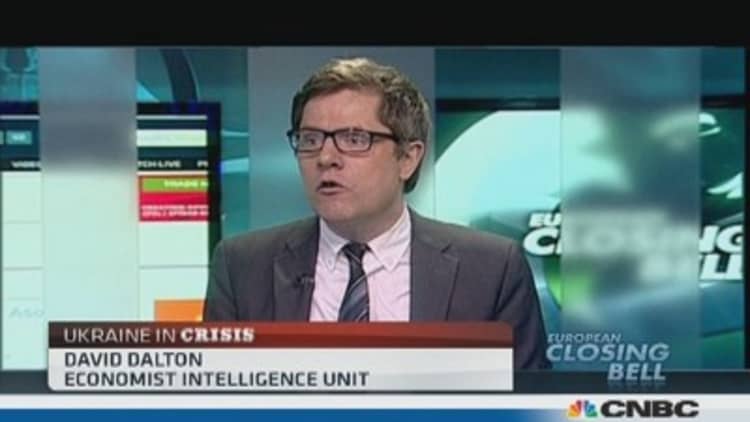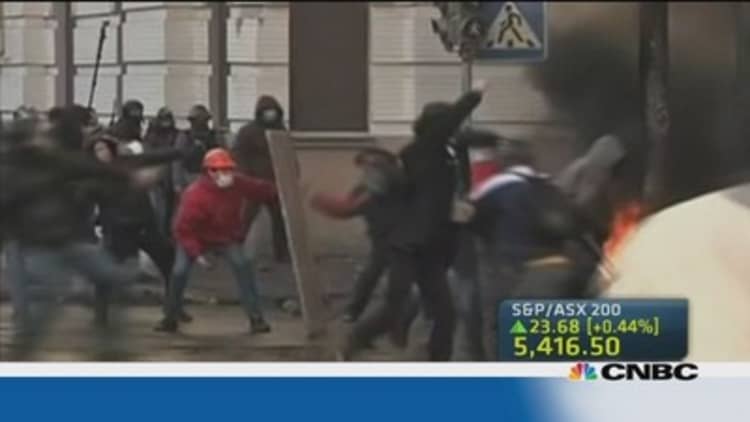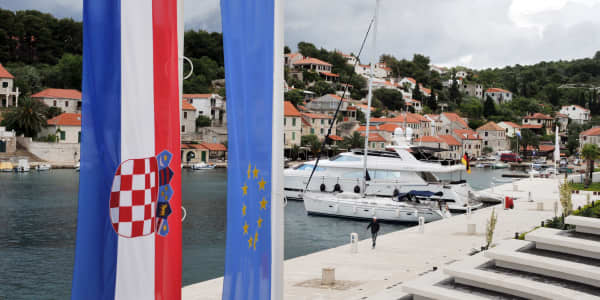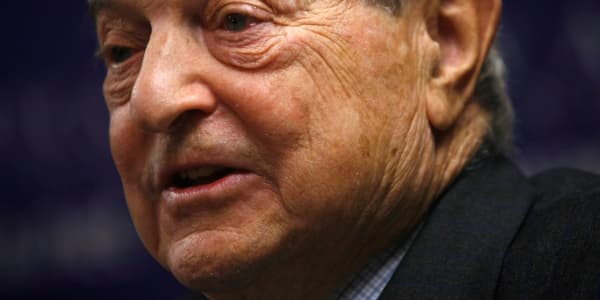
The European Union has called an extraordinary meeting of its foreign ministers on Thursday as the violence in Ukraine escalates, with the bloc expected to impose sanctions on those responsible for the bloodshed in Kiev.
In a statement released by the European Commission, the EU's executive, President Jose Manuel Barroso said that the EU would respond to any deterioration on the ground in Ukraine.
"We therefore expect that targeted measures against those responsible for violence and use of excessive force can be agreed by our member states as a matter of urgency," he said on Wednesday. The measures the EU could opt for could include financial sanctions and visa restrictions.
(Read more: Ukraine protesters confront police anew after nation's bloodiest day)
Ukraine president Viktor Yanukovych replaced the army chief and the military said it would take part in a national anti-terrorist operation to restore order.
The move came a day after 25 people were killed and over 425 injured in clashes between police and protesters at the sprawling protest camp in the Ukrainian capital. Officials have often referred to the protesters who have demanded Yanukovych's resignation for months as "terrorists."
Meanwhile, President Barack Obama warned on Wednesday that there would be consequences if violence continues in Ukraine, saying the Ukrainian military should not step into a situation that could be resolved by civilians.
Speaking to reporters ahead of a meeting with Mexican President Enrique Pena Nieto, Obama said he condemned the violence in Kiev in the strongest possible terms, and said he believes a peaceful resolution is still possible.
Several ministers from across Europe also called for tough action on President Yanukovich and blamed Russia for exacerbating the violence.
"We see unacceptable Russian pressure and threats, based on the faulty logic of the zero-sum game, being brought to bear on those who seek closer cooperation with the EU," Carl Bildt, Sweden's minister for foreign affairs said in a statement on Wednesday. He added on Twitter that President Yanukovich had "blood on his hands."
Donald Tusk, the prime minister of Poland, said he would pressure other EU leaders to impose sanctions on Ukraine's government, according to Reuters.
(Read more: Renewed violent Ukraine unrest, markets badly hit)

The fiery protest continued to rage into the early hours of Wednesday morning as a geopolitical and ideological battle between Russia and the West turned violent after weeks of relative calm. United Nations' human rights chief Navi Pillay called for an urgent and independent investigation into the violence on Wednesday afternoon, including the possible use of excessive force, according to reports.
The pro-EU Ukraine region of Lviv declared independence from the government on Wednesday afternoon, according to Interfax-Ukraine news agency. The executive committee of the Lviv region's council, the People's Rada, has assumed full responsibility for the fate of the region and its citizens, it said in a statement. The western city of Lviv, an opposition stronghold, has played a key role in the protests that have rocked the capital.
Speaking at a special session of the Polish parliament, Tusk said he would hold talks with the leaders of the biggest EU countries and institutions, and persuade them to impose sanctions - both personal and financial. French Foreign Minister Laurent Fabius added to the growing calls for sanctions, saying that France and Germany would discuss the situation in Ukraine on Wednesday with individual sanctions "probable", according to Reuters.
Protesters in Ukraine have been camped on Kiev's Independence Square and surrounding streets since December after the Ukrainian president's surprise decision not to sign an association agreement with the European Union.
(Read more: Ukraine risks 'civil war': EU justice chief)
This would have strengthened political, trade and economic ties between the 28-nation union and Ukraine – in favor of closer ties with Russia. Instead the Ukrainian government has turned to Russia, opting for President Vladimir Putin's offer of $15 billion of aid. Russia solidified its help for Ukraine with a fresh cash injection of $2 billion on Monday to support its heavily indebted economy, according to Reuters.
Kremlin spokesperson Dmitry Peskov said on Wednesday that Russian President Vladimir Putin had discussed events in Kiev with Ukrainian President Viktor Yanukovich by telephone overnight, according to Reuters. Peskov added that Russia sees the protests in the country as an attempted coup and denounced them as "radicals".
Timothy Ash, the head of emerging market research at Standard Bank believes there is a real reluctance in the international community to think the unthinkable: that there is a risk of a civil war in the country.
"It is important to remember that civil wars do not have to be about ethnicity, but can be about religion and ideology and simply power," he said in a research note on Wednesday, giving examples of conflicts in Georgia and Azerbaijan.
"What really concerns me is the complacency in the international community, particularly the EU at present, with fairly bland non committal statements coming from Western leaders. This reminds me of the run up to the conflict in Bosnia – a very strong statement, but Ukraine is currently on the brink and perhaps someone needs to say it, and say it clearly," he said.
Newton played down any talk of either a civil war or a split in Ukraine between the Russian-speaking and non-Russian speaking regions. Regis Chatellier, a London-based strategist at Societe Generale, told CNBC that a smooth ending of the protests and the integration of the opposition to the new government is extremely unlikely.
"We think it is likely to end up in strong repression from the government as there is no possible compromise between the two visions (pro Russia versus pro EU)," he said via email.
"If at some point there is a risk of a split of the country, we think that the Ukrainian army could intervene, and this could mean an indirect control of Russia on Ukraine."
Michael Ganske, head of emerging markets at Rogge Global Partner agrees with Newton, rejecting talk of a split within Ukraine. The best case scenario, he said, would be a constitutional change that would limit the power of the president with snap parliamentary and presidential elections called. However, he added that the situation was extremely difficult and it was not clear what the resolution would ultimately be.
—By CNBC.com's Matt Clinch; Follow him on Twitter @mattclinch81. Reuters contributed to this report.





